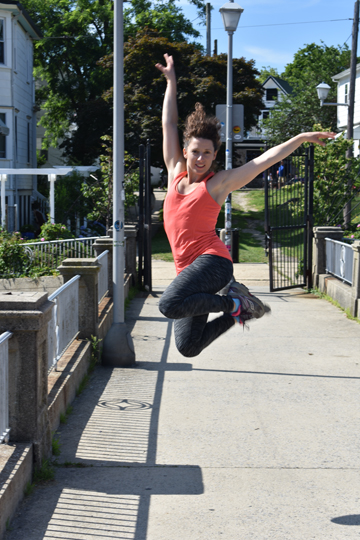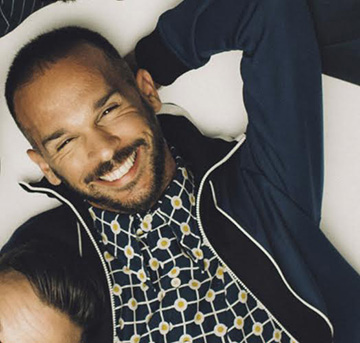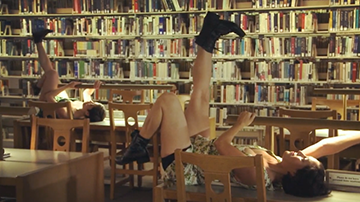Wanted: Three choreographers who aren’t “afraid to get their hands dirty.”

Alexandra Vidich.
The prize? A $5,000 grant to each artist, along with the chance to work with a mentor to create performance works to be seen next fall.
This is Grass Stains, a program designed to help choreographer’s create site-specific works, which means they are designed for a venue other than traditional theater, says Pioneer Winter, who founded the grant program.
Even the grant’s name was chosen specifically, says Winter.
“Grass stains means ‘Let’s get our hands dirty, lets not be afraid to go in the grass or the mud,” he says.
“This doesn’t mean that the works are all required to be outdoors; it’s about using the environment,” he adds.
The idea behind a site-specific work is to cast a fresh perspective on a place that may have become ordinary. For instance, says Winter, “We’ve all been at the beach, but a site-specific idea might be to put a dancer there, dressed in a flowing white costume, and performing in a five-foot hole.”
Grass Stains began in 2016, and is administered through the Pioneer Winter Collective, Winter’s nonprofit organization.
Grants are offered every two years. The program began in 2016.
According to Winter, a unique aspect of the program is that it provides not only financial aid, but also mentoring; all of the selected artists (not only the grant winners) are given the opportunity to work with Stephan Koplowitz, who will spend a week in residency in Miami in May.
Koplowitz is an award-winning director, choreographer and media artist renowned for his site-specific multimedia performances, which he has created throughout the world.
The former dean of the Sharon Disney Lund School of Dance in Los Angeles, Koplowitz has, since 1984, created 87 works and been awarded 60 commissions. He is also the author of a book on site-specific dance, and, since he created an online course on the topic three years ago, more than 20,000 people from 151 countries have taken it.

Liony Garcia
In Grass Stain’s first year, seven artists were selected; four of them to develop original works. Admission was free of charge, and seen by about 1,500 people, according to Winter.
This year, 11 artists were selected out of 30 applicants, and three of them were chosen to create works; Liony Garcia, Sandra Portal-Andreu, and Alexandra Vidich.
They will work with Koplowitz in May, and then present their programs during October-December. These site-specific performances will be held in Miami-Dade County, and will be free to the public.
“What I love about the program is that it will enable me to create a work that is immersive – I’m really interested in breaking down the barriers of performance and immersing the audience in the work,” says Portal-Andreau, who was a ballet dancer before becoming a choreographer and creating and performing work through her own group, bETTA Dance Theater.
While she intends to wait until she works with Koplowitz before choosing a venue, she is also very delighted to be working in her hometown of Miami, she says.
“I do have some spaces in mind, and one in particular that I’m really drawn to, because it’s where I went to for social events when I was growing up, is a particular space in Hialeah,” she says. But, she adds, “I’m willing to change my mind.”
Vidich moved recently to Miami from Philadelphia, where she was known for creating immersive art, particularly, “Constant and Invisible River,” a project which she funded through her own non-profit organization, “Invisible River,” which garnered not only support, but also local and national press, she says.
Although Vidich had selected a venue for her Grass Stains project, based on a “hip” mural she saw there one day, when she went back, she discovered that what she thought was a permanent piece of art really wasn’t – an Apple advertisement now stood in its place.
“I am still going to work on the idea of the mural, but it will be done elsewhere,” she says.
As a professional dancer, Garcia has worked with numerous companies, including Body Traffic in Los Angeles, and, in Miami, the Rosie Herrera Dance Theater, Whole Project, Bistoury Physical Theater, amongst others. He is also current resident artist at Miami Light Project and 6th Street Dance Studio.

Sandra Portal-Andreu
Garcia has a definite idea about the type of project he wants to create, and it strongly differs from the natural surroundings so often beloved by site-specific artists.
“I believe we do enough works with flowers and fauna here; it’s the industrial worksites and workspaces that speak to me,” he says.
He also has a particular industrial site in mind, and he looks forward to “putting something whimsical in it,” which, he says, “will speak to the whole idea of site-specific dance; interjecting dancers in a place where you don’t expect them.”
Grass Stains will sponsor a free talk that will open to the public Stephan Koplowitzduring his May residency here. Details on that, along with the time and places of the three performances created by the grant winners, will be announced at pioneerwinter.com. Pioneer Winter Collective, Florida’s only dance company to focus on LGBTQ and other marginalized communities will premiere its latest dance performance, “Reprise,” at 8:30 p.m. Thursday, March 22 and Friday, 23 at the Miami-Dade County Auditorium, 2901 W. Flagler St.




